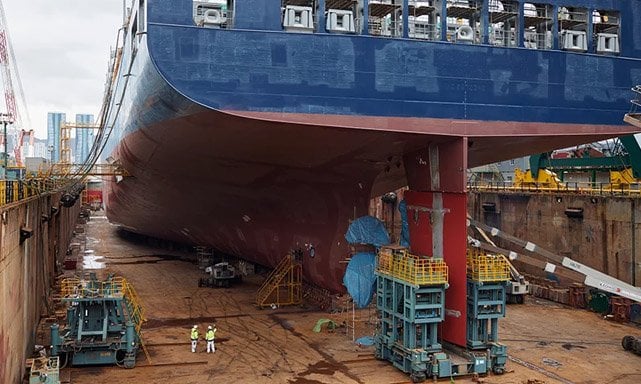“Pay as You Save” Model Launched to Encourage Green Refits

The financial community is partnering with the Global Centre for Maritime Decarbonization to launch a novel financing mechanism, which they believe will help to overcome the barriers slowing retrofits of ships to make them more efficient and reduce emissions. They point out that uncertainty over the fuel savings, difficulties in predicting ROI, and the split-incentive issues between shipowners and charters are some of the key barriers to these refits, and which they believe they can overcome with their unique financing model.
The Fund for Energy Efficient Technologies (FEET) will provide up to 100 percent financing for retrofits that improve energy efficiency. The Global Centre for Maritime Decarbonization has long been an advocate of improving the efficiency of existing ships through the adoption of technologies, including wind-assisted propulsion and air lubrication under the hull. It points out that these technologies can deliver immediate fuel savings, which it believes will assist shipowners to stay competitive as regulations of shipping emissions and efficiency increase.
FEET was designed to address the financial barriers to refits. The financing, provided in the form of an unsecured lease, is decoupled from the vessel’s mortgage. Critically, the owners repay the loan as the technology provides quantified and verified fuel and regulatory savings.
“This is exactly the kind of collaborative, problem-solving mindset needed to move the needle on maritime decarbonization,” said Professor Lynn Loo, CEO of GCMD. “There was no playbook; our teams were learning as we went.”
GCMD highlights that one of the big challenges, which it believes is making financing the retrofits difficult, is the uncertainty on the return on the investment period and the lack of standardized methodologies to accurately measure fuel savings. It points out that there is an inherent variable in the fuel savings, which depends on operational and environmental factors ranging from routing to weather conditions.
It believes the contribution to the fuel savings from these technologies can be isolated to data collection and the building of models, which will improve at predicting the savings as more data is collected. GCMD has undertaken performance pilots, equipping vessels with additional sensors, and will continue to apply rigorous data analytics to quantify fuel savings with statistical confidence.

that matters most
Get the latest maritime news delivered to your inbox daily.
Singapore-based fund manager AIM Horizon Investments will be managing the fund with the Development Bank of Japan, the Asian financial Group DBS, and global financial institution ING agreeing in principle to provide the senior debt financing. The effort secured total initial commitments of up to $35 million, exceeding the initial targets for the fund. GCMD and AIM Horizon Investments report they plan to scale the fund to $500 million by 2030, capable of supporting refits on around 200 vessels.
They report strong initial interest from the industry, as well as manufacturers and vendors supporting the industry. Several projects have already been identified, they report, and those projects have progressed to the final investment decision stage.
